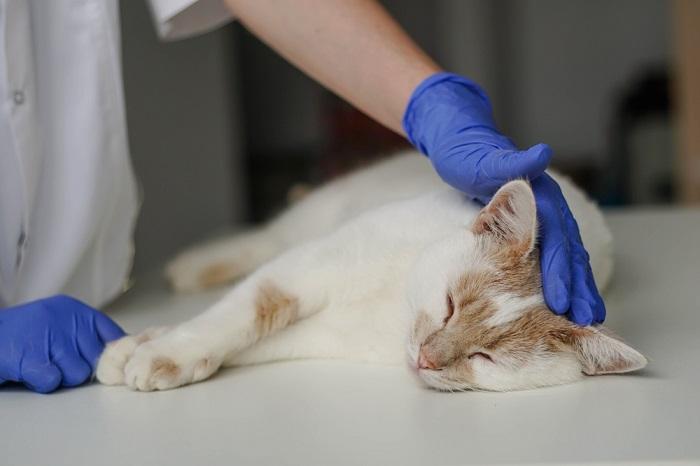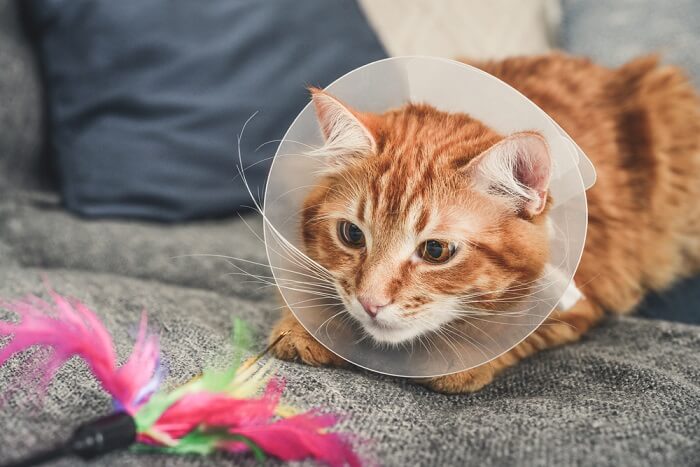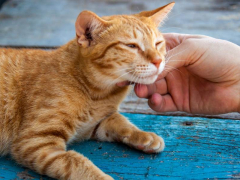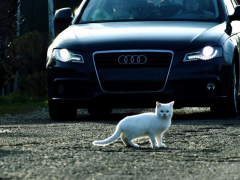
North America is rife with different species of scorpions. Many of these are harmless, but all species of scorpion are capable of injecting venom from the stinger on their tails. They can also do some pretty bad damage with their pincers, too.
Cats, as we all know, are very curious. They love to explore their environment and are very inquisitive about everything in it. If they spot a scorpion scuttling about, they are likely to investigate. Cat/scorpion encounters are very common for these reasons.
What Does a Scorpion Sting Do to a Cat?
Let’s bust a few myths regarding scorpions. All scorpions have venom. Some are more venomous than others. A few of the most dangerous include the striped bark scorpion and the Arizona bark scorpion.
The majority of scorpions don’t cause any serious harm to animals. The thing to bear in mind is that even if they aren’t poisonous, they can still cause your cat a lot of pain—the sting and the pincers can do some serious damage. The sting can also make them vulnerable to secondary bacterial infections at the sting site.
Some cats also have an allergic reaction, too, so scorpion stings need to be avoided at all costs. Some people believe that cats are immune to scorpion stings. This is not the case.
Cats might be good at hiding the fact they have been stung, but they are definitely not immune. It does seem, however, that cats get stung way less by scorpions than dogs or even humans. This could be due to their “quick as a cat” super reflexes—cats are agile and better at escaping.
Signs of Scorpion Stings in a Cat
A sting will always be a noxious stimulus for your cat, whether or not the venom is deadly. Initial symptoms of a scorpion sting include:
- Yowling/meowing
- Swelling and pain at the sting site
- Licking/scratching of the sting site
- Twitching/head shaking
- Skin irritation
- Agitation
- Lameness (limping) if on a limb
As time passes you might see more severe reactions, which include symptoms such as:
- Loss of balance
- Hypersalivation
- Vomiting/diarrhea
- Convulsions/seizures
- Dilated pupils/abnormal eye movements
- Loss of consciousness
- Shivering/ muscle tremors
- Collapse
- Difficulty breathing
- Trouble swallowing
- Issues with urination or defecation
How Do Scorpion Stings Affect Cats?
Most of the severe signs are caused by scorpions with strong neurotoxic venom that, when released, targets the cat’s central nervous system. Some of the signs might be seen even if the venom isn’t as strong.
As stated above, scorpions can do quite a lot of physical harm just by jabbing their stinger into your cat or crushing them with their pinchers so it really does depend on the species of scorpion and what happened with the interaction with your cat.
What To Do if You Think Your Cat Has Been Stung

Seek urgent veterinary care, even if you only suspect a scorpion sting.
If you think your poor kitty has been the victim of a scorpion sting, seek veterinary attention immediately. Do not attempt to judge if your cat has just had a mild sting or isn’t reacting. There is no way you can gauge the severity without the help of a trained professional. On the way to the vet or while you are waiting to get through on the phone them, there are a few things you can do to help yourself and your cat:
- Don’t panic. A scorpion sting is an alarming and stressful situation, but your cat needs you to stay calm and keep a cool head so you can think logically.
- Keep your cat with you at all times so that you can monitor them. Don’t let them out of your sight. Your cat might decide to skulk off to hide because they are wounded. They might want some space and solitude, but you must keep an eye on them at all times to monitor for symptoms.
- Search your cat for the sting site and make a note or take a photo if possible. This way you can monitor any changes, such as a cellulitis reaction or any swelling.
- If you can still see the scorpion and you are feeling brave, safely retrieve it and bring it to your vet. Your vet will be able to identify the scorpion and find out how dangerous the venom is. If you can’t catch the scorpion, attempt to take a picture of it to show your vet.
Can a Scorpion Sting Be Fatal?
Usually, scorpion stings are not fatal. Even a nasty sting from the bark scorpion is unlikely to result in death, provided your cat is taken to the vet and receives treatment as soon as possible. It does depend on pet owners to act quickly and get the cat to the vet.
In the worst-case scenario, there might be severe health complications for your cat. However, these do not usually result in a fatality. If you get to your cat’s vet in time, you can avoid more serious side effects and issues.
How To Prevent Cats From Getting Stung
The best way to prevent your cat from getting stung is to contact a pest control specialist. They can come to your home and analyze the space to look for signs of scorpion activity. They can tell you what sort of scorpions you have and remove them for you.
That way, your cat won’t come across one on their day-to-day prowling of the house and the yard. Also ensure your cat has plenty of enrichment toys in their environment so that they don’t get bored and search elsewhere for entertainment. Keeping your cat indoors will slightly reduce the risk of them encountering a scorpion.
Scorpion Stings: Final Thoughts

If you live in a part of the country that is occupied by scorpions, you might have come across one or two already. Scorpion stings do cause a lot of pain and discomfort for cats, however, the stings are rarely fatal.
Luckily, your cat is more likely to scare off the scorpion than the scorpion standing their ground and attacking. It is still advised to monitor your cat closely if they come in contact with a scorpion. If you are suspicious that your cat has been stung, seek veterinary attention as soon as possible.
Also Read: Can Cats Sense Danger?







